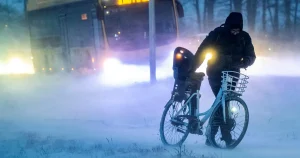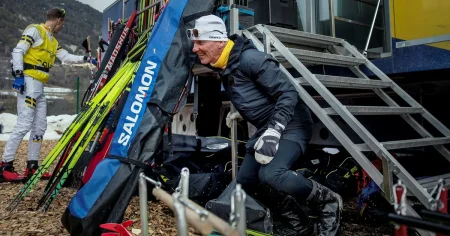Naomi Osaka, the 27-year-old former world number one and two-time Australian Open champion, recently advanced to the second round of a tournament after defeating Caroline Garcia in a hard-fought three-set match. However, her victory was overshadowed by the devastating wildfires raging in Los Angeles, her current residence. Osaka expressed her difficulty in concentrating on the match, revealing that her home in Los Angeles had become even more significant due to the memories created with her young daughter, Shai. The wildfires, which have tragically claimed the lives of at least 24 people and displaced thousands, have left Osaka deeply concerned about the safety of her family and the city she calls home. While her family remains unharmed, she confessed to constantly monitoring the fire maps and expressing apprehension about returning to Los Angeles immediately after the tournament.
Osaka, who represents Japan in international competitions but resides in Los Angeles, further elaborated on the logistical challenges she faced amidst the crisis. She recounted how she had to arrange for someone to retrieve her daughter’s birth certificate from her home, highlighting the disruptive impact of the wildfires on everyday life. The scale of the disaster is immense, with entire neighborhoods reduced to ashes and a massive evacuation effort underway. The situation has understandably left Osaka preoccupied, dividing her attention between her professional commitments and the unfolding tragedy in her adopted city. Her comments reflect the emotional toll of the wildfires, extending beyond the immediate physical devastation to create a sense of anxiety and uncertainty among residents.
The wildfires in Los Angeles represent a significant natural disaster, impacting not only the physical landscape but also the emotional well-being of residents like Osaka. The loss of life, displacement of communities, and destruction of property have created a climate of fear and uncertainty. The ongoing nature of the crisis, with firefighters still battling to contain the blazes, adds to the anxiety. Osaka’s words provide a glimpse into the personal struggles faced by individuals affected by the disaster, highlighting the challenge of maintaining focus and normalcy amidst such turmoil. Her decision to potentially postpone her return to Los Angeles reflects a broader concern for safety and well-being that resonates with many residents.
Osaka’s situation underscores the interconnectedness of personal and professional life, particularly in the face of unforeseen circumstances. While she strives to maintain her focus on the tennis tournament, the devastating events unfolding in her home city understandably weigh heavily on her mind. This internal conflict between her professional obligations and her personal concerns creates a complex emotional landscape. Her decision to publicly share her anxieties reflects a growing trend among athletes to acknowledge the impact of external factors on their performance and mental well-being. It also highlights the humanizing aspect of professional sports, reminding us that even elite athletes are not immune to the challenges and anxieties of everyday life.
The wildfires in Los Angeles serve as a stark reminder of the power of nature and the vulnerability of human communities. The scale of the destruction and the loss of life underscore the urgent need for effective disaster preparedness and response strategies. The ongoing efforts of firefighters and emergency responders highlight the importance of community resilience in the face of such crises. Osaka’s personal experience adds a human dimension to the tragedy, emphasizing the emotional toll exacted by such events. Her decision to postpone her return to Los Angeles reflects a prudent approach, prioritizing safety and well-being amidst the ongoing uncertainty.
The wildfires in Los Angeles have created a complex and evolving situation, impacting individuals, communities, and the environment. The immediate priority remains the safety and well-being of those affected, with ongoing efforts focused on containing the fires, providing shelter and support for evacuees, and assessing the long-term damage. The wildfires also raise important questions about urban planning, disaster preparedness, and the impact of climate change on the frequency and intensity of such events. Osaka’s experience provides a personal and poignant perspective on the human cost of these disasters, reminding us of the importance of empathy, community support, and resilience in the face of adversity.














